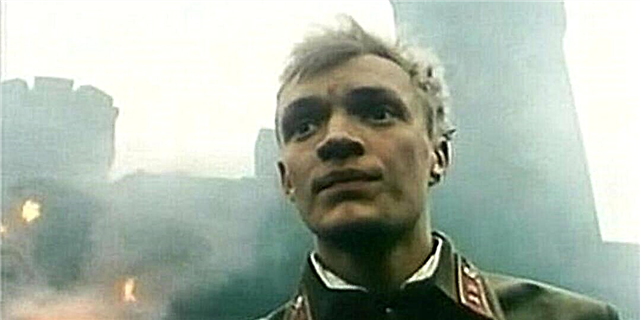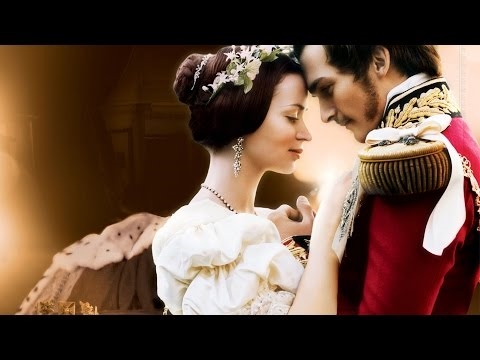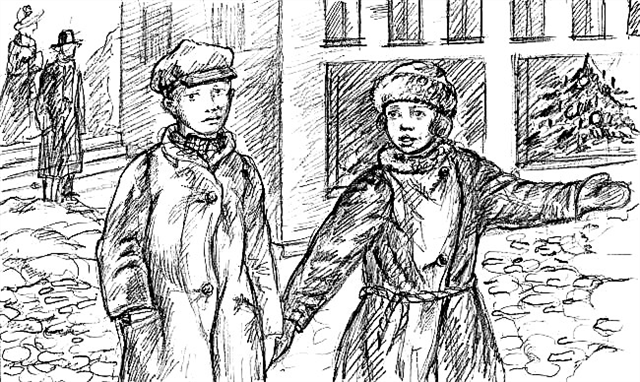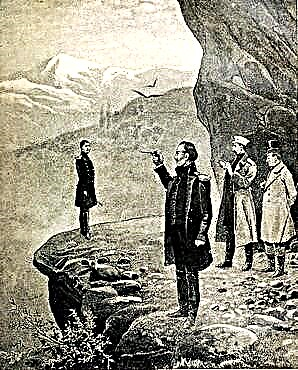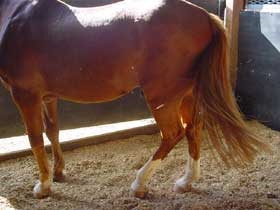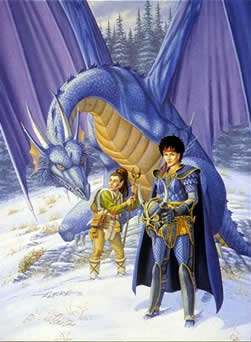Dzyady - the name of the rite, preserved from pagan times. On the day of Dzyad, the magicians priests commemorate the dead and offer them sacrifices - food and drink.
All three parts of the poem are written in the form of a play. The second and third parts of Miscavige are preceded by the poem "Ghost". In it we are talking about the ghost of a young man who, during his lifetime, was unrequitedly in love with a girl. Because of his unrequited love, the young man suffered contempt and pity not only from those around him, but also from his beloved girl, therefore, even after death, his spirit cannot find peace.
Part II
The second part involves the Wizard, the Elder, and the Chorus of Peasants. The action takes place in the chapel in the evening. The sorcerer and the Elder conduct the Dzyad rite, they are echoed by the Chorus of peasants. Windows and doors are already closed in the chapel, and lamps are lit. The wizard begins to summon the dead to offer them a sacrifice.
Rush to us! Gates open
This saint’s house
Alms are ready for you -
Treats, and drinks,
And prayer and rites ...
Two angels appear under the vault of the chapel. These are the souls of deceased infants, brother and sister. Where the children ended up after death, everything is enough, so the souls refuse the food that the Wizard offers. Souls complain: although they spend days in joy and games, they cannot find the way to heaven. Everything from the fact that the children died sinless and did not know the bitterness of life:
One who did not know grief in the world,
After death, joy does not know.
Instead of food and ceremonies, children's souls ask the Wizard for two mustard seeds - they will help them learn the bitterness of life. Having received grains, souls fly away.
A ghost appears who neither drinks nor eats. The wizard drives him away. The old man pours a cauldron of vodka and sets it on fire. When the vodka burns down, the Magician invokes souls that have long been languishing in hell. Outside the window you hear the voice of a ghost, which owls, crows and eagles do not allow to enter the chapel. This is the soul of a landowner who died three years ago. The landowner is cursed - he is tormented by eternal hunger, and birds of prey peck flesh. The soul is tormented and cannot go to hell or paradise. The landowner was cruel in life. The birds that torment him turn out to be the souls of the peasants tortured by a pan. The landowner’s soul no longer hopes for paradise, but in order to go to hell, his peasant slaves must sacrifice him. The Spirit asks:
If only I measure water
And in addition to that water -
If only two grains of wheat!
Birds of prey do not want to let go of the soul. Raven recalls that he was a peasant, whom the pan executed because of two apples, which he took from the pansky garden. The owl was a woman who, together with her infant, was dying of hunger. They came to the estate of Pan at Christmas time when he had guests. The landowner ordered the poor thing to be driven away, and she froze with the child. The landowner realizes that he did not deserve help and forgiveness:
After all, the one that is at least a little
He was not a person in this life,
People cannot help out!
The wizard tells the spirit to disappear. Then he lights the holy grass and calls for "intermediate spirits" who lived "like a mallow", without any benefit to themselves and people. The ghost of a beautiful girl is.
In the handle the stem is green, thin,
A lamb is running before her
A moth frolic over her.
A ghost is trying to catch a lamb or moth, but they are not given into her hands. During her life, the girl was a shepherd Zosya, beautiful, but empty. She died at the age of nineteen, never having ever fallen in love. In the next world, she is doomed to frolic forever, to spend time in empty amusements, to soar above the ground. Zosi’s soul is exhausted from boredom and longing. She wants a boy hugging her - then the girl can touch the ground.
Who didn’t know the earth here,
He will not go to heaven!
Peasant boys are afraid, do not want to hug a longing soul. Then the Magician predicts that the girl does not have to suffer long - in two years she will be "beyond the threshold of paradise."
Towards the end, the Wizard calls on any soul and orders to open the windows and doors of the chapel - the Dzyadov rite ends. Suddenly, behind the "shepherdess in a black dress" who sat on the tomb, the Magician sees a terrible ghost that crawled out from under the ground.
She showed her heart
And he did not say a word!
In vain the Wizard tries to find out what the ghost needs - he is silent. Then the wizard drives the ghost away, but he does not move. Neither the sprinkler nor the thunder candle helped. Then the wizard turns to the shepherd, but she is silent and smiles. The shepherdess is taken out of the chapel by the arms. The ghost follows her.
Part iv
The action takes place in the dwelling of Ksienda. The clergyman and his children have just had supper and began to pray. Suddenly there was a knock on the door and the Hermit in strange clothes came in. The children are scared, mistaking the guest for the deceased, but he reminds someone of Ksionzu. The hermit says that he is like a dead man - he died for the light.
And to your doorstep
Came from afar. From hell, from paradise
I don’t know, but I am striving again for the same land.
Kohl know, good priests, so show the way!
The priest replies that he will not show anyone this way, and invites the Hermit to warm himself at his hearth.
Soon the priest notices that the stranger is insane. From time to time, the Hermit begins to sing, and his speech is hazy and terrible. The priests are trying to reach out to his mind, but in vain, they seem to speak different languages. In between singing (The Hermit sings passages from Goethe and Schiller), he asks the priest to take him to the next world. Then he takes out a dagger and tries to pierce his heart with it, but the Xyonds holds him back. The hermit notes that there are nine more on the clock, and three candles are burning on the table, and says that it is not time to leave yet.
Seeing the book on a shelf, the Hermit said that it was they who destroyed his life. He was raised in classical literature. His soul did not want earthly love, but sought sublime feelings. Not finding sublime love in distant lands, the young man threw himself into the maelstrom of "base pleasures." Only when he returned home, he found what he was looking for so long, "found to lose forever." The young man fell in love with a girl who was given to another. She also loved him, but chose a rich life, and she herself ordered him to leave. The young man became a Hermit, and his mind became clouded with grief and unrequited love.
The Hermit's tale is interspersed with bouts of insanity, during which the unfortunate does strange things. So, he finds a spruce branch near the house, calls it his friend - a branch of cypress, and demands that the priest talk to her. The priest, trying to comfort the Hermit, recalls his grief:
I buried my father and mother a long time ago,
Two small children were taken to heaven.
I parted with my beloved wife -
My friend is happy and in short.
The hermit answers that Ksienda's wife was dead while she was still alive:
The virgin named by the wife
As if alive hidden underground!
After all, from the father, from the mother, from the brother
And from everyone she once loved
She denied the threshold from a stranger!
Therefore, he considers his beloved dead, although she is still alive. The hermit believes that death is different. It is easiest to mourn a beloved when she dies in the family circle. Another death is much worse:
Not One - Two She Enough
And kills gradually.
It was such a death that her lover condemned to the Hermit, she herself remained to live in wealth and prosperity. The priest again begins to console the Hermit, but he is amazed and afraid: it was these words that his beloved said to him goodbye
Meanwhile, the clock strikes ten, a rooster sings outside the window, and one of the three candles on the table goes out. It is as if it awakens the Hermit from a nightmare. Only now the guest and the host will recognize each other. The hermit turns out to be Gustav, the adopted son and apprentice of Ksiendza. The priest cannot understand what happened to Gustav:
You Gustav! You, beauty and pride of youth!
What a lovely little boy you were then!
And now ... In such a strange way you are.
Gustav accuses the Xyonds of his death - after all, he taught the young man to books. However, the Hermit understands that the Xyondz acted out of the best awakenings, and therefore forgives him. The priest thinks that Gustav will stay with him, but he refuses. The hermit recalls the father's house, which now stands abandoned, and only the old faithful dog guards him. Then he embarks on the memories of his childhood, which he spent near the house of Ksienda, about a friend Jan Sobieski. It was at the priest’s house that Gustav met his love. Here he built a gazebo in which he met with his beloved. The arbor was preserved, and in it the Hermit found a scrap of his letter that the girl threw out. The Hermit is bitter to see this:
She doesn’t even need my memos!
The last particle is forgotten of the past!
And next ... Next, behind the bars of the garden,
A shining palace in the darkness piled up.
That is the palace of his former lover, in which a cheerful holiday is making noise. The hermit peered out the window, saw her next to her husband, cheerful, surrounded by guests, and lost his mind. The hermit tries to come up with a revenge worthy of her betrayal, but then forgives her: he was too closely associated with this girl. They had the same thoughts, feelings, passions, but the girl was captivated by the brilliance of gold. In the end, the Hermit decides to forget her.
Cry sweetheart! Your Gustav is dying.
Dare, Gustav! Steel is already sparkling!
With these words, the Hermit lifts a dagger to drive it into his heart. Xenza Gustav, who entered at that moment, asks not to tell the girl that he died of grief. On the contrary, the priest should tell her that Gustav was a merry hangman and a gambler, and died from a leg dislocated during the dance. With these words, the Hermit plunges a dagger into the chest.
Then the clock starts to beat eleven, the cocks again sing and the second candle goes out. To the amazement and fear of Ksienda, the Hermit does not die. He calmly takes a dagger out of the wound.
Do not worry. I tell you:
It’s not every day I can create such a sin.
It happened - condemned - and only for teaching
I again reproduced what was done at the beginning.
There are no wounds on the Hermit's body, and the Ksiendz begins to guess that a guest came to him from the next world. The soul of Gustav was heard by the priest on the day of Dzyad and came for help. The Gyeongds denies this holiday, calls it a pagan and unclean rite. Gustav says that the dead need the prayer of the living, and proves this: he is leaning towards the office where the bug-soul lives. She asks the priest for three prayers. There are many such souls around. The bug was a moneylender, a moth circling around the lamp - a court dandy, and mosquitoes - flatterers. They all want peace. Gustav is also doomed to wander near his beloved.
The clock strikes again, and the rooster sings. The last candle goes out and Gustav the Hermit disappears. The choir sings:
Who was in heaven at least once before death,
Dead, it doesn’t get there right away.
Part III
This part of the poem is dedicated to Yan Sobolevsky, Tsiprian Dashkevich and Felix Kulakovsky, who were persecuted for their love of the motherland. Senator Novosiltsev, sent to Poland by Alexander I, carried out a series of repressions, as a result of which the color of Polish students was exiled to Siberia. These events are discussed in the third part of the poem "Dzyady".
Prologue
The action takes place in the Lithuanian city of Vilna, in the monastery of the fathers of the Brazilians, turned into a state prison. Prison cell. The prisoner is sleeping, leaning on the windowsill. A guardian angel hovers over him. He reproaches the prisoner, accuses him of pride. The angel warned the prisoner many times, but he did not want to listen:
Foreshadowing the light lot,
I cradled you in the sky
But alas, your sinful spirit
He was deaf to heavenly songs.
The prisoner wakes up, but dreams torment him, and he falls asleep again. Meanwhile, the spirit appears on the left side, and begins to seduce the prisoner with the night lights of the city and fair-haired beauties. Other nightly spirits chant the night that "is made for the hawks." The angel, meanwhile, says that the prisoner went to jail in order to experience suffering and to understand what path God chose for him. The angel inspires the prisoner that he will soon be released. While the prisoner wakes up, then falls asleep again, the spirits on the right and left sides fight for his soul. She needs both dark forces and light, because the prisoner is a poet who is able to overthrow the thrones of kings.
Act I. Scene I
Midnight before Christmas, the prison corridor. In the distance is an armed guard. Several young prisoners with candles go out of their cells. A familiar corporal let them out for a walk, taking advantage of the fact that the guards got drunk. The prisoners decide to go to the most spacious cell in which Conrad is imprisoned. Konrad is the poet described in the prologue. He has a spacious chamber with a fireplace, in which prisoners light a fire. A general conversation ensues. Everyone talks about himself.
Zhegota, an ordinary sheep farmer, was arrested without any reason. He did not participate in conspiracies and thinks that all this was started by the authorities for the sake of profit. Tomas tells about Senator Novosiltsev, who fell out of favor with the emperor and now "opens conspiracies" to curry favor. Zhegota believes that he will be acquitted, but Tomas was the head of the student society, and disagrees with his comrade:
We have only one way to salvation:
Someone will have to accept the blame
And, helping everyone out, die alone.
He is about to die, "to save the brave, young from enemy paws." Tomas was the longest in custody, and most of all he endured the trials. Friends speak of him as a "patriarch", claim that he was born for such a life and feels great in prison.
The conversation is about the investigation. Yan Sobolevsky, who was in the city during interrogation, saw how "twenty-five pupils were driven to Siberia <...> pupils from Zhmudi" to Siberia.
In broad daylight so that all people can see.
Have a parade.
After a detailed story by Sobolevsky, the prisoners opened a bottle of wine. One of the prisoners, Felix, entertains everyone with revolutionary songs. Meanwhile, “the tower is beating midnight.” The hour of Conrad comes, "he soared with his soul to another world." The poet sings here an invented song, the gloomy meaning of which terrifies the prisoners: “How terribly he looks! That is the song of Satan! ” The prisoners try to stop him, but the song of Conrad goes into delirium. At this moment patrol steps are heard. The prisoners lay the poet and quickly disperse.
Scene II. Improvisation
Left alone, Conrad continues to speak out loud. His speeches are like delirium. He says that none of the living can comprehend the deep meaning of his poems.
My creator is worthy of inspiration!
Such a song is the creation of the universe,
Such a song is like a feat for a fighter,
Such a song is the immortality of the singer.
Gradually, the demon of pride takes possession of the poet. He feels equal to God and asks him to share his power with him.
I want, like you, to reign over human souls,
I want, like you, to own and rule them.
Not waiting for an answer from the Lord, Conrad accuses him of a lack of love for people. The poet is convinced that God rules not by love, but by cold wisdom. At this moment, the angels and demons again enter the battle for the poet’s soul, and Conrad himself challenges the Lord:
I’ll become a worse enemy than Satan:
He fought on the minds, I will - on the hearts.
Konrad feels that he is supported by all of mankind, and God is “forever alone” and creates “wrong judgment”. It was he who gave the poet love, and then took it away. Konrad again demands to grant him unlimited power, and threatens to shake the world and throw off the altar of the Lord. At this moment, the voice of the Devil is heard. Conrad staggers and falls. Spirits on the right side are trying to protect him. Then the priest Peter comes into the camera. Spirits on the left side scatter.
Scene III
Bernard’s monk Peter enters Conrad’s cell, accompanied by a corporal and one of the prisoners. They see that the poet is sick - he is pale and delirious. The priest led the corporal: he looked into the camera and found that something was wrong with the poet. Konrad begins to rave again, and the priests Peter sends the corporal and the prisoner.
Left alone with the patient, the priest discovers that he is obsessed with the devil. Peter begins to pray in order to free the poet’s soul.The devil resists, speaks all the languages of the earth, tries to deceive the priest. The priests do not listen to the demon and continue to pray. In the end, the devil begins to beg for mercy:
Why should I strike like cattle?
After all, I’m not the king of devils, I’m the devil in a meager rank.
You can not punish a servant, since Mr. guilt.
After all, I didn’t come myself, I was sent by Satan.
The priest begins to read a prayer casting out demons, and makes the devil say how to save the prisoner. Conrad should be comforted with wine and bread. Having told this, the demon disappears. Conrad comes to his senses and thanks Peter for his salvation. The Gyeongds replies:
Pray! The Lord has appointed you a test.
You insulted the greatness of the Eternal with blasphemy.
That the devil has corrupted your mind with an evil lie.
The poet falls asleep, the priest continues to pray. A Christmas carol is sung in the chapel outside the cell wall, and a choir of angels sings over Peter.
Scene IV
Village house near Lviv. Midnight. Two girls enter the bedroom, the sisters Eva and Marcelina. At such a late hour, Eve does not sleep - she prays for students who were innocently convicted and exiled to Siberia.
There are thousands of dead. Padu in a plea last
For them and for the one who sang these songs.
The girl points to a book of poetry. After praying, Eve falls asleep. An angel appears above her and sends the girl a vision. Eve sees herself among beautiful flowers. Then the flowers come to life and whisper something to Eve.
Scene v
The Gyeongds prays in his cell. The Lord sends him a vision:
The fierce Herod stood up and his bloody rod
He stretched out over Poland young.
The priest sees how the carts with captives flow along the roads leading north - to prisons and mines. In the carts - children of Poland, youth. One child was saved. The priest sees that “a wonderful deliverer” will grow out of him. Then Peter sees European tyrants, kings, who judge the Polish people and trample to ashes. The Polish people appear before the priest in the form of a man who is going to be executed. On the back, a man drags a cross of three species of wood - three peoples. They crucify a man on the cross and “kings of soldiers” pierces him with a spear. Under the choir of angels, the executed one flies up to heaven and the priests recognize it:
I remember him since childhood,
He matured in the crucible of troubles!
Peter sees that this man “will subordinate the worldly thrones to his great church,” and he arose “from the knights rattled in the ancient world, and a stranger.” At this, the priests fall asleep to the singing of angels.
Scene VI
Senator's bedroom. The Senator himself is drunk, tossing and turning in bed, but he cannot fall asleep. Two devils sit at his head and wait for the Senator to fall asleep. They want to scare the Senator by showing him a dream of hell. Beelzebub appears here and forbids scaring the Senator, the Vedas can be corrected from fear, and his soul will be lost to hell.
You can attack the soul
I inflate her with arrogance
Shove in a pool of shame
Burn with disdain
General mockery
But about hell - silence!
Beelzebub flies away, and the devils send a terrible vision to the Senator. He sees the tsar pouring his favors on him - money, the princely title, the position of chancellor. The adviser ends up in the king’s waiting room, full of courtiers. A pleasant whisper is heard around: "Senator in mercy." Then the king enters the reception room and turns away from the Senator, gets his back to him. All with contempt turn their backs on the Senator; evil jokes, witticisms and puns in the form of flies, wasps and mosquitoes wind around him.
Senator falls out of bed. The devils seize his soul and carry him away to sleep, "where hell and conscience border." Having finished the soul with a whip, the devils will return it to the body after the third cry of the roosters, and again will be locked up “in consciousness, in reason, like a mad dog in his stinking box”.
Scene VII
Warsaw socialite. An exquisite society drinks tea at a table - high-ranking ladies, generals and staff officers, prominent writers. At the door is a group of young people and two older people. They speak French at the table, and Polish at the door.
Young people are discussing the situation in Poland and Lithuania, where “blood is pouring”, and a dinner party is being discussed at the table. The ladies regret that Novosiltsev left Warsaw:
Never without him did the ball succeed, -
As in the picture, he grouped the guests.
At the door they speak indignantly of the torment suffered by the leader of the Polish youth, Tsikhovsky, and at the table the poet reads his fresh verses, written in French and dedicated to “pea sowing”.
Soon the groups come together. The young lady is trying to tell representatives of the upper world about the situation in Lithuania, about Tsikhovsky. However, these people do not care about her interlocutors. Chamber Junker states:
In my eyes, Lithuania is like a part of another planet:
Paris newspapers are completely silent about her!
The young lady, however, does not give up, asks the old Pole to tell about the ruined Tsykhovsky family, with whom he has long been familiar. Knows Tsykhovsky and a young man named Adolf:
I have known him since childhood. Tsikhovsky young
It was considered a wit. Smart, handsome.
The young man also had a bride. Shortly after the wedding, he disappeared. Only three years later he was noticed in a crowd of prisoners. Three years later, a rumor spread in Warsaw that Tsikhovsky was alive and was in prison, where he was terribly tortured. One night he was returned home and assigned to spies, hoping that the young man would betray his friends. Adolf could not talk to him, only from a distance he saw his emaciated face.
I understood everything from his eyes that day, -
Such a mournful clouded their shadow.
I would compare the eyes of the sufferer and eyelashes
With glass windows of a trellised dungeon.
A month later, Adolf discovered that Tsykhovsky was crazy about the trials that fell to his lot: he was seized by the mania of persecution.
A young lady offers venerable writers to write a poem about Tsikhovskolm, but they refuse. They only write about past events in their circle. Then the society at the table switches to a discussion of high-profile gossip. Young people are outraged.
Scene VIII
Vilno, reception in the house of Senator Novosiltsev. There is a secretary at the window. Novosiltsev is drinking coffee. Next to him is the chamberlain, Pelican and the doctor. At the door there are a guard and footmen. The senator is out of sorts: he was tired of Vilna and he dreams of Warsaw. Novosiltsev hopes that the conspiracy revealed to him personally will help him get a higher post.
The footman reports a messenger from the merchant Kanissyna, to whom the senator owes a large sum. Having decided that the merchant was completely lying, the senator orders to bring his son to the "conspiracy". It doesn’t matter to Novosiltsev that the young man has long become a Moscow cadet and almost never appears in Vilna. The doctor assists him:
There were secrets here, but when
Mr. Pan took up the case, he opened them without difficulty.
At this time, the mother of Rollison arrives, a student who was recently arrested. The young man was given three hundred sticks, but he did not betray his friends. Mrs. Rollison is blind. Every day the widow goes to the senator and asks for her son. This time the woman received a protection letter from the princess, and the senator had to accept her.
An elderly and blind lady, Rollison, came accompanied by her friend and priest Peter. Rollison begs the senator to spare his son, she is sure that the boy is alive. It seems to the woman that she heard the cries of her son:
Those scary screams through the thickness of the walls reached
A slightly audible, quiet sound ... He rushed from afar,
But my rumor penetrated faster and deeper than the eye.
How tortured him!
The senator is trying to convince the woman that this was nonsense. The unfortunate falls to his knees in front of him. Then the door swings open and a young lady in a ball gown runs into the reception room to the sound of music. Novosiltsev wants to leave, but Rollison grabs him by the clothes and begs to let at least Prince Pyotr to the boy. The senator does not agree. Then the widow calls for help to the young lady, says that her son has been in captivity for a whole year. The senator pretends that he did not know this, promises to sort it out and sets up a meeting for the woman for seven hours.
Overjoyed, Rollison leaves, the priests Peter remains. The senator tells Pelican to take her to jail with her son and lock her in a neighboring cell. The doctor and Pelican tell the senator that this matter should be dealt with quickly - Rollison has consumption, the guy is really bad:
Rollison is crazy - he tried more than once
He kills himself, rushes to the window,
And the windows are locked ...
However, the senator does not care about the fate of the young man. He realizes that this priest told the widow about her son. He is trying to involve a priest in his “conspiracy”. The secretary begins to draw up a protocol of interrogation, and the senator threatens Peter. But the priest does not admit how he learned about the torment of the young man. The priest is bullied, and when he asks if the shroud is ready for the senator, Novosiltsev orders to call the executioner. Thanks to the doctor’s prompting, he begins to understand that through the priest Prince Chartorysky can be attracted to the “conspiracy”:
Kohl come up skillfully
I will bring the prince trouble for ten years.
Novosiltsev owes too much to the prince, and has long dreamed of getting rid of him. After showering the doctor with favors, the senator sends him away, and then tells the secretary to take custody of the Aesculapius: the doctor knows too much and is quite fit for a “conspiracy”. The Gyeongds predicts the doctor's quick death.
After that, the governor, accompanied by smartly dressed guests, enters the reception room. They arrange dancing at the reception, they speak French. The ball begins. The guests are intriguing, discussing the senator:
Yesterday, like a beast, clawed prey,
Tortured and poured innocent blood.
Today, sweetly purring,
Playing with the ladies in love.
The society is divided into two parts: one condemns the flatterers to Novosiltsev, the other condemns.
Suddenly the orchestra begins to play the Commander’s aria, the guests are scared of gloomy music. At this moment, Mrs. Rollison enters the room. He screams that her son is killed, thrown out the window. Ksiendz Peter reassures the woman with the news that her son is still alive. Widow faints. There is a roll of thunder. Lightning strikes the doctor’s room window and kills him. A conductor of heavenly electricity is a pile of silver coins of royal coinage. The senator orders the widow to be taken away. Using this order, the priests take her to her son. Thunder booms again, and guests scatter in fear.
The senator, Pelican and the priest remain in the room. The priests are silent. The senator is frightened by his silence, because Peter predicted the death not only to the doctor, but also to him. Novosiltsev lets Peter go. At the door the priest meets Conrad, who is being taken for interrogation. The poet recognizes the priest who saved him. He gives Peter a ring so that the priest sells it, orders mass, and gives the remaining money to the poor. The priests foretells the poet a long way and an unknown friend who will meet Conrad "with the word of God."
Scene IX
Night of the Dzyads. In the cemetery at the chapel - Magician and a woman in mourning. The wizard calls the woman to the church, but she is going to stay in the cemetery. A woman is waiting for a guest:
That many years ago
Appeared to me, pale, haggard,
A crowd of spirits surrounded
In the blood from head to toe,
And burned me with dumb reproach
With his brilliant, wild gaze.
The wizard tried to call this spirit, but he did not appear. The wizard believes that the soul is still alive. Souls of the living can also appear on the night of the Dzyad, only they are dumb. The wizard remains to help the woman. They see lights above the chapel - souls flock together, but they do not need one among them. In the chapel they read the spell of fire:
The bodies are dominated by the evil spirit
So call out of the earth.
The woman and the Wizard are hiding in an old oak tree burnt by lightning and are waiting. The wizard sees a fresh corpse:
In the orbits of the skulls are empty
Two golden ones burn with fire
And the devil sharpens on every claw.
The corpse holds silver coins, pours them from hand to hand. Coins burn it. The dead man asks the Wizard to take silver for the orphans and the wretched.
Meanwhile, the night of Dzyad ends. The wizard for the last time tries to evoke the spirit the woman needs. Suddenly they see:
From the Gediminas Chambers
The wagons fly north.
Ahead, all in black - the one they have been waiting for so long. He is all wounded by swords, and these wounds inflicted by the enemies of the people will heal only after death. He casts a terrible look at the Wizard and the woman and turns back.

